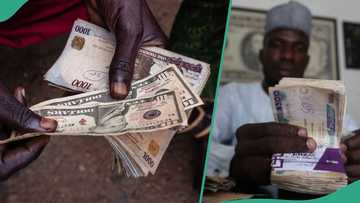From N841/$: Naira Loses to Dollar, Falls by 35% to New Price
- The average rate of exchange between the US dollar and the naira decreased by 35.53%, according to data
- The NFEM's average turnover increased from US$0.12 billion in Q4 2023 to US$0.20 billion, a 61.30% increase
- The economy's outflow of foreign currency climbed from US$6.59 billion in Q42023 to US$10.76 billion, a 63.28% increase
Don't miss out! Join Legit.ng's Sports News channel on WhatsApp now!
Legit.ng journalist Zainab Iwayemi has over 3-year-experience covering the Economy, Technology, and Capital Market.
A study by the Central Bank of Nigeria (CBN) states that in the first quarter of 2024, the average exchange rate of the naira versus the US dollar in the Nigerian Foreign Exchange Market (NFEM) dropped by 35.53%, from N841.15/US$ in the fourth quarter of 2023 to N1,304.72/US$.

Source: Getty Images
On a daily basis the naira appreciated 3.12% on Wednesday, according to statistics from the FMDQ Securities Exchange Limited, with the dollar trading at N1,543.84, versus N1,592.06 on Tuesday and N1,579.22 on Monday at the Nigerian Autonomous Foreign Exchange Market (NAFEM).
As a result of increasing market trading activity, the average turnover at the NFEM jumped by 61.30% to $0.20 billion from $0.12 billion in Q4 2023.
PAY ATTENTION: Click “See First” under the “Following” tab to see Legit.ng News on your Facebook News Feed!
The CBN's economic report for the first quarter of 2024 states that the economy's net foreign exchange inflow during the review quarter was US$11.50 billion.
The amount of foreign currency coming into the economy rose from US$17.71 billion in Q4 2023 to $22.26 billion, a 25.69% rise. From US$5.01 billion in the previous quarter to $8.09 billion this quarter, the Bank received more inflow.
In a similar vein, revenue from independent sources rose to $14.17 billion from $12.70 billion in the previous quarter.
The term "foreign exchange inflows" describes the money or assets coming into a nation's financial system from outside. These influxes might originate from a number of sources, including aid, loans, portfolio investments, remittances, exports, and foreign direct investment (FDI).
These inflows are vital because they supply the foreign money required to sustain imports, balance payments, stabilize the local currency, and bolster the economy as a whole.
The economy's outflow of foreign currency increased by 63.28 percent to US$10.76 billion from US$6.59 billion in Q42023.
The foreign reserves continued to be higher above the three-month import cover.
Compared to US$33.22 billion at the end of December 2023, the external reserves stood at US$32.29 billion by the end of March 2024.
The amount of external reserves in the review quarter may be sufficient to support either 10.1 months of imports of goods exclusively or 7.1 months of imports of goods and services.
As of August 20, 2024, Nigeria's external reserves were valued at $36.46 billion, according to figures provided by the CBN.
Customs exchange rate changes again
Legit.ng reported that Muda Yusuf, the CEO of the Centre for the Promotion of Private Enterprise(CPPE), had urged the Central Bank of Nigeria (CBN) to change its policy on the Customs import duty rate to clear goods at ports.
The CBN earlier directed customs and related parties to adopt the closing rate in the official foreign exchange (FX) window for import duty.
According to the CBN, the FX rate at the point of importation should be used for import duty assessment until the termination date and clearance were finalised.
Proofread by Kola Muhammed, journalist and copyeditor at Legit.ng
PAY ATTENTION: Donate to Legit Charity on Patreon. Your support matters!
Source: Legit.ng





